DEARBORN, Mich. (RNS and NPR) — ‘The Arab community got their message across that we could no longer be taken for granted,’ said one Christian and Palestinian American. ‘Even though we’ve paid a heavy price.’
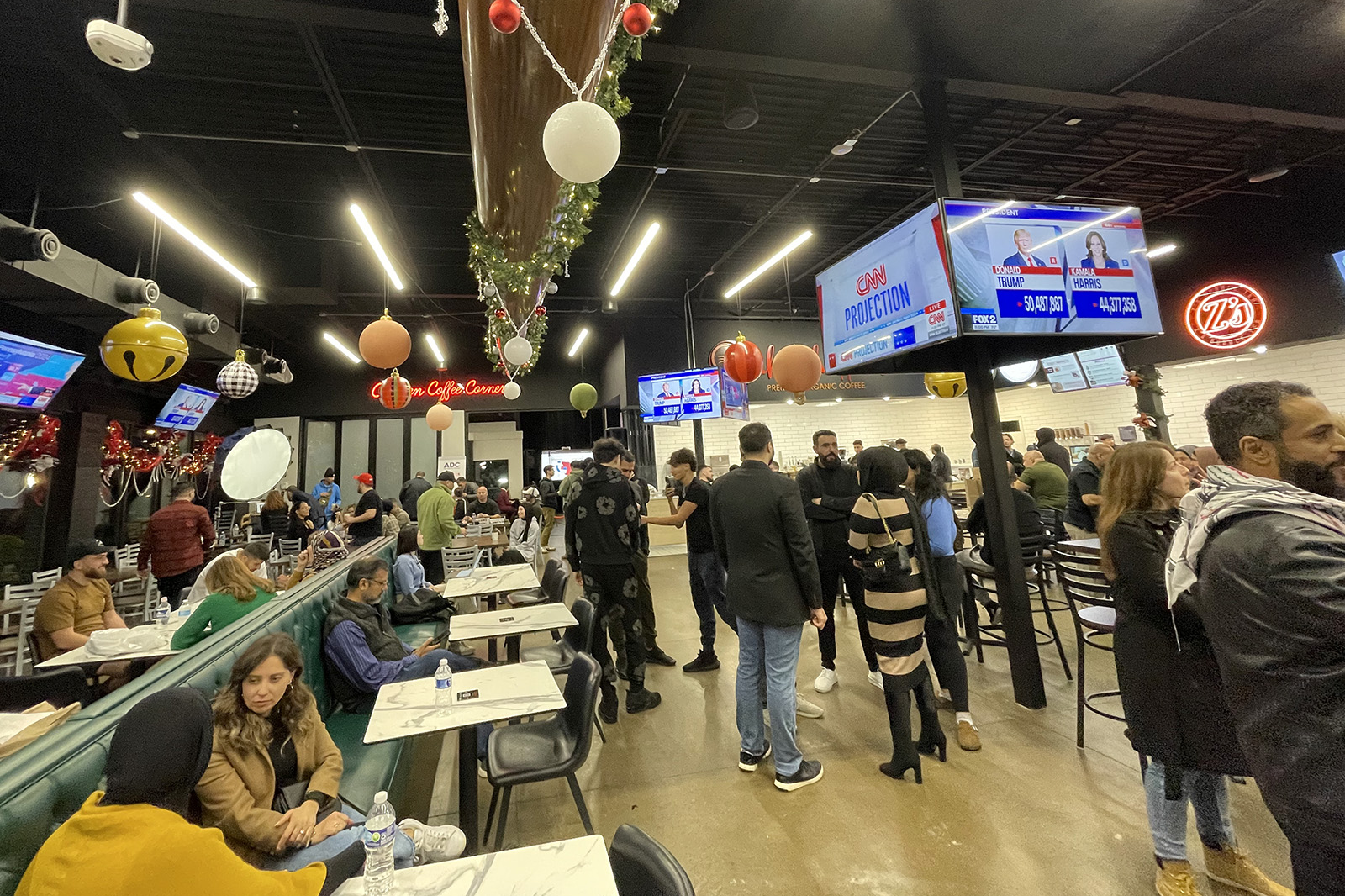
People gather to watch election night results at The Canteen at Midtown, Nov. 5, 2024, in Dearborn, Mich. (Photo by Nargis Rahman)
Nargis Rahman
November 16, 2024
DEARBORN, Mich. (RNS and NPR) — Jumana Judeh understands why so many in her Arab American community voted the way they did in last week’s presidential election, even as she had tried to get them to change their mind, endorsing Kamala Harris in the final days before the election.
“It wasn’t the outcome that I was hoping for. But at the same time, I think the Arab community got their message across that we could no longer be taken for granted,” said Judeh, a Christian and a Palestinian American. “Even though we’ve paid a heavy price.
“I’m scared. I have no clue what Trump is going to do. I don’t think Trump knows what he’s going to do,” she added.
Home to one of the largest Arab American communities in the country, Dearborn, Michigan, has long been considered a Democratic stronghold. This election, the city went Republican for the first time since 9/11, with 42% voting for former President Donald Trump and only 36% supporting Vice President Harris. Nearly 1 in 5 voted for third-party candidate Jill Stein.
For months, including throughout the primaries, Arab Americans and Muslims around the country have vowed to vote “uncommitted,” third party or Republican in protest of the Biden administration’s continued support of Israel and its deadly military operations in the Gaza Strip, where more than 40,000 Palestinians have been killed.
Stein, who received 18% of the city’s vote, was at the Dearborn Banquet Hall on election night for a Green Party watch party, along with members of the Abandon Harris campaign.
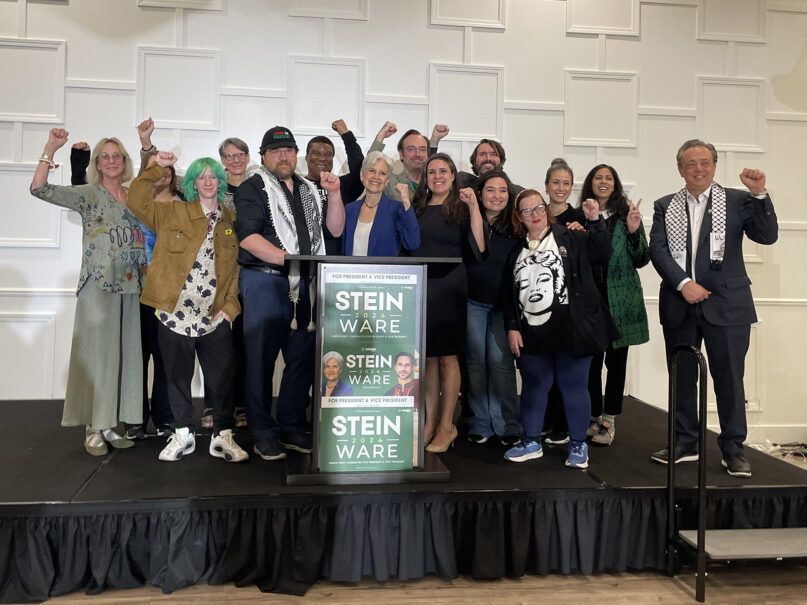
Green Party presidential candidate Jill Stein, center, poses with supporters at the Dearborn Banquet Hall, Nov. 5, 2024, in Dearborn, Mich. (Photo by Nargis Rahman)
“Dearborn is ground zero for fighting the genocide and for demanding democracy that actually listens to the American people. So, it’s not only Muslim Americans, but it’s all of Americans who are demanding an end to this genocidal war,” Stein said.
Zeinab Chami, a Dearborn Public Schools teacher who voted for Stein, was among a crowd of people at The Canteen at Midtown food court in Dearborn on election night watching TV screens as the results rolled in.
“I expect really nothing from the national elections. I don’t think they’re going to change their positions on anything,” said Chami. “I do agree with the notion that we have to punish the Democratic Party.”
RELATED: After dispiriting election, Muslim Americans question whether politics is a game they can influence
The Council on American-Islamic Relations conducted an exit poll of American Muslim voters Nov. 5-6. Robert McCaw is the director of government affairs at CAIR. He said the poll found 53% of Muslim voters nationwide voted for Stein, 21% voted for Trump and 20% voted for Harris.
“This poll really represents a three-way race in the Muslim community, which is a first time for us, and we chalk that up to deep disillusionment with the candidates due to the Gaza genocide,” he said.
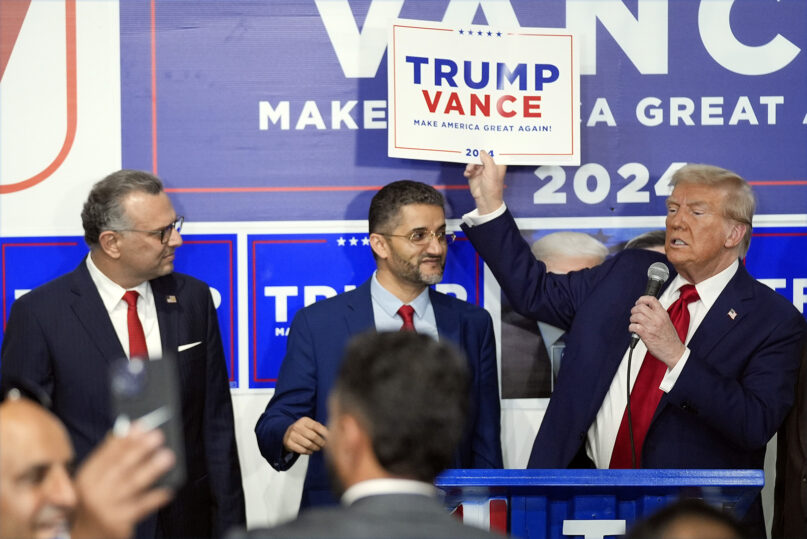
Republican presidential nominee former President Donald Trump, right, speaks as Hamtramck Mayor Amer Ghalib, center, and Massad Boulos, left, listen at a campaign office, Oct. 18, 2024, in Hamtramck, Mich. (AP Photo/Evan Vucci)
McCaw said Harris really alienated Muslim voters — noting her use of Liz Cheney as a surrogate, whose father was the vice president of an administration that escalated its military presence in the Middle East during the Iraq War. Meanwhile, Trump campaigned in Michigan and promised an end to the war.
“Muslim voters, going forward, expect Donald Trump to uphold his end of the bargain and pursue peace immediately in the region,” he said.
But little more than a week after the election, some Muslims have raised the alarm over the president-elect’s Cabinet picks, including former Arkansas Gov. Mike Huckabee as ambassador to Israel and Florida Sen. Marco Rubio as secretary of state. Both are avid supporters of Israel’s war in Gaza.
And Pennsylvania Sen. John Fetterman, a Democrat, lashed out at the community in an interview with Semafor, saying: “So, Dearborn delivered for Trump? OK, congratulations. You’re going to love the next Muslim ban.”
But for many Muslim supporters of Trump — a candidate who campaigned on mass deportations and in his first term instituted the “Muslim ban” against immigrants from several majority-Muslim countries — the choice was always an ambivalent one.
“We don’t necessarily agree with all his policies. We would have loved to have found a home in the Democratic Party,” said Faye Nemer, founder of the MENA American Chamber of Commerce, who said she voted for Trump as a protest vote against Democrats.
“As a woman, I would have loved to see a woman as president. But unfortunately, that did not manifest for us, because she (Harris) wasn’t receptive to our concerns, to our community’s concerns,” Nemer said.
The community is quiet, said Judeh, “because even though some of them supported Trump, we can’t forget that he wanted to, you know, deport all Muslims and stop Muslims from coming into the country.”
In response to Fetterman’s comments, Dearborn Mayor Abdullah Hammoud — the first Arab American and first Muslim to hold that post — said people in his city are hurting now, with “almost everybody I know” having lost a loved one or having a loved one injured in Gaza or in Lebanon, where the war has spread. That pain has an urgency to it, he said.
“People here feel betrayed. For nearly one year, we warned the Democratic presidential candidates on the issue of Gaza,” said Hammoud, who had refused to meet with Trump or endorse Harris before the election, in an interview with MSNBC. “Tell us today why it was worth the risk of a Donald Trump presidency for you to stand in strong alignment with Benjamin Netanyahu and his cabinet of war criminals?”
Imam Mustapha Elturk, the president of the Islamic Organization of North America in Warren, Michigan, a county where Trump won 56% of the vote, says he’s encouraging congregants to accept the results of the election.
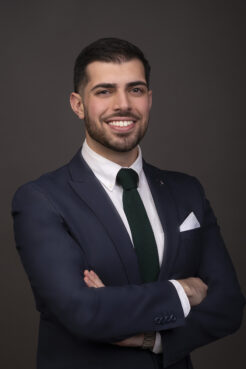
Bilal Hammoud is executive director of the American Arab Chamber of Commerce. (Courtesy photo)
“It’s God’s will, literally,” he said. “I try to let our community understand, that no matter who the people vote for, it is in God’s wisdom, we have to accept and be content with the results, even if they did not turn out to our favor.”
He says people should be united despite their differences and work together to be civically engaged, hold officials accountable and consider running for office.
Bilal Hammoud, the executive director of the American Arab Chamber of Commerce, said that no matter how they voted, there was no winning for Arab Americans, describing the atmosphere of the election night Canteen party as “somber” and “anxious.”
“Ultimately, even though some of them got what they were looking for, it wasn’t a celebratory energy,” Hammoud said. “That room was just anxious because nothing was going to result in a victory for this community.”
“What we did see was a deep anxiety that was felt and now knowing as the reality sinks in of what today brings and tomorrow,” Hammoud said, describing “a deep sense of fear for where this country is headed.”
Judeh didn’t support Trump, but she believes the only way forward for Arab Americans is to put party politics aside.
“I would like to see the Democrats and the Republicans in the community come together and try to deal with this president now that we have him for four years,” she said.
Nargis Rahman is with NPR member station WDET.
This story was produced through a collaboration between NPR and RNS. Listen to the radio version of the story.
Opinion
After dispiriting election, Muslim Americans question whether politics is a game they can influence
(RNS) — In the days since the presidential election, American Muslim political and civic leaders are debating whether continuing to work within the country’s two-party system will ever produce gains for the Muslim community.
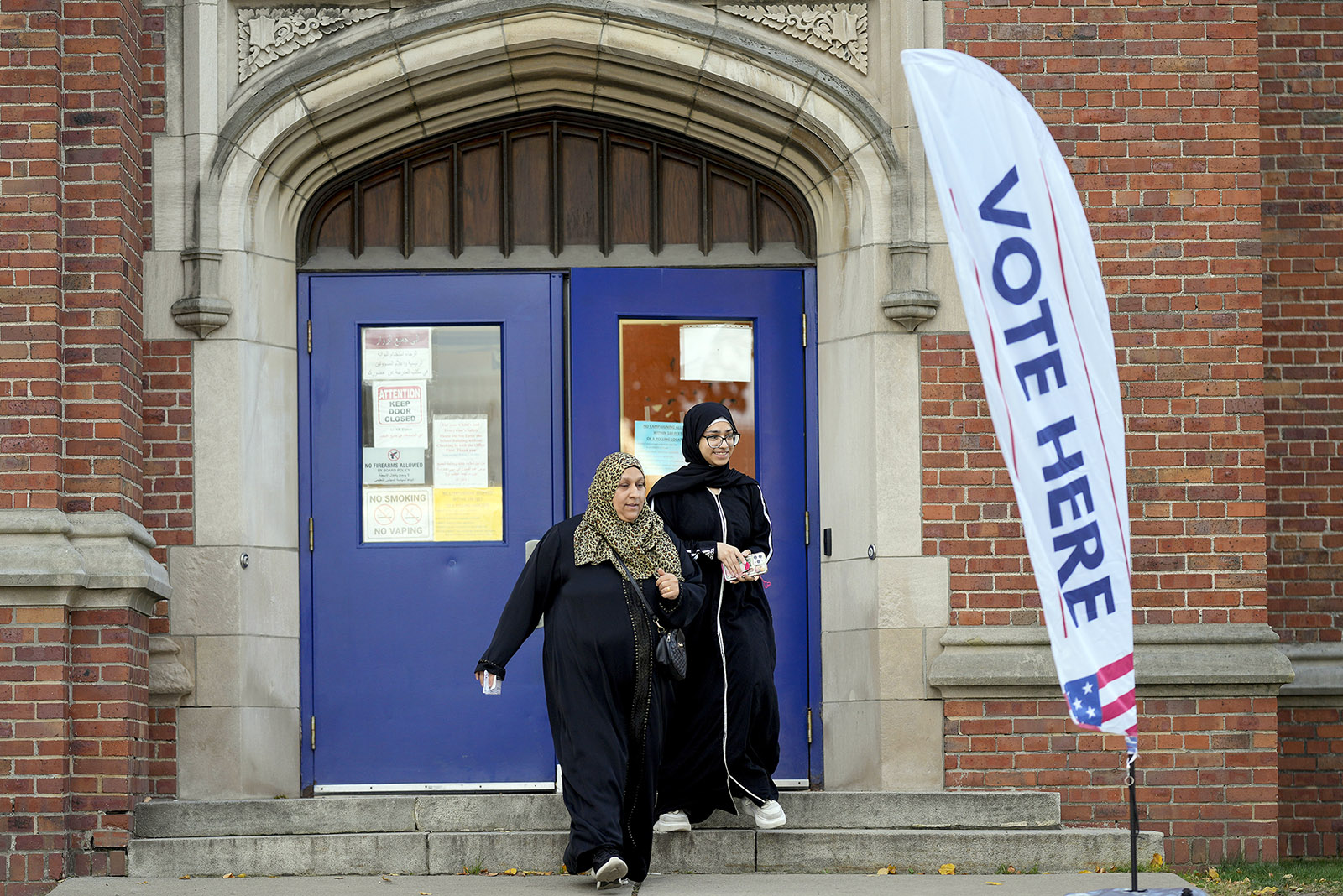
Voters depart a polling place at McDonald Elementary School, Nov. 5, 2024, in Dearborn, Mich. (AP Photo/Charlie Neibergall)
Dilshad Ali
November 15, 2024
(RNS) — In the last days leading up to the 2024 presidential election, a large swath of American Muslims agreed on one thing: None of the choices for president was a good one.
As President-elect Donald J. Trump’s victory became clear in the early hours of Nov. 6, the Wednesday morning quarterbacking began. While not a deciding factor — national exit polls showed that Trump won by energizing his base and drawing Latino men in greater numbers — the Muslim vote, for many, was meant nonetheless to get the attention of politicians, particularly Democrats.
Namely, Muslims voted their anger and grief over more than a year of war in Gaza and, more recently, in Lebanon. With the Democratic administration supporting and arming Israel, voting for Kamala Harris became for many an improbable choice, and voting a painful decision. “No one who wanted Kamala to lose wanted Trump,” said a Muslim organizer in Michigan who wanted to remain anonymous. “No one who wanted Kamala to lose (didn’t) empathize with Blacks. But their family members are dying now.”
An exit poll conducted by the Council on American-Islamic Relations showed 54% of Muslims voted for Green Party candidate Jill Stein, 21% for Trump and 20% for Harris, with another 3% voting for other third-party hopefuls. In Michigan, Stein drew 59% and Harris just 14%, according to CAIR, with other candidates getting about the same share as nationally.
RELATED: In Philadelphia, a Muslim hub, presidential election feels to many like no choice at all
The size of the vote for Trump took many Muslim political and governmental careerists by surprise, given his promise of mass deportations and his previous attempts to ban Muslims from entering the country. But as a whole, the election left Muslim Americans asking whether their community’s dissenting vote was effective. Will rejecting the Democrats’ “same old, same old” message gain anything?
Youssef Chouhoud, a political science professor at Christopher Newport University, said motivations behind third-party votes are misplaced. While “there’s a push towards more engagement outside the two-party model,” he said, many voted for a third party out of “fantastical, fairy-tale thinking about how we’re going to break the duopoly. I thought that was frankly irresponsible. By that same token, I thought the folks who were pedaling (Gaza) as a single party issue were also frankly irresponsible.”
The Michigan organizer said conversations are swirling — Muslim Democrats didn’t represent the community’s Gaza concerns well enough, some say; Harris barely mentioned Gaza in her campaign, others point out; Trump mentioned American Muslims in his victory speech, which Harris never would have done.
Those who stumped for Harris, meanwhile, point out that Democrats’ ignoring the plight of Gaza and Palestine, while a terrible thing, is a single-issue vote that could be addressed once Harris won and took office.
And so a decades-old debate reared its head: Should American Muslims disengage with traditional political and governmental work and stop seeking a seat at the table? Whether American Muslim political and civic leaders or government careerists should continue to work within the country’s two-party system is a reckoning going on in many WhatsApp group chats, meeting rooms and private conversations across the country.
Over the past two decades, Muslim activists have employed a strategy of working from the inside and the outside. A key example is Emgage, a Muslim political advocacy group, that works to get out the vote in even-numbered years and, between elections, to place Muslims in government-appointed positions
But those who grew up in the decade after 9/11, said the Michigan organizer, had internalized the Islamophobia of the time. Raised to please people, American Muslims in their leadership style, their stances and the way they speak were not forthright about their beliefs.
Muslims “weren’t educated about Palestine and Gaza enough,” she said. They “were wishy-washy about how to talk about it, especially in interfaith environments; and three, not as tied to the entire ummah (Muslim community) as much as we were to our countries of origin and America.”
RELATED: Stonewalling Muslim voters on Gaza has become a bipartisan effort
My own reporting for the decade after 9/11 was full of Muslims trying to prove their worth as Americans, who were pushed by others to condemn any violence or terrorism (as well as often internally subscribing to the “model minority” mentality) around the world. Heading into another four years of Trump, how American Muslims work and fight for the things they want from their country is in a much different place than 2016.
The past year, the organizer said, has opened her eyes to the kind of engagement American Muslims should be doing. More than a year of watching Palestinian and Muslim children, babies, women and men displaced and blown up in attacks funded by U.S. taxpayer dollars has created disillusionment, and many say the current strategy isn’t working.
Chouhoud agreed that trying to effect change incrementally from within ends up watering down Muslims’ message. “But,” he said, “I also find valid the argument that if I can make things 1% better (by working within established political systems), why wouldn’t I try?”
In 2012, he worked on a “#MuslimsVote” project, which I also was a part of as the editor of Altmuslim, in which we published stories about voting, election issues, civic engagement and more. At the time, the engage/don’t engage question was perpetually being debated around topics like White House-driven CVE (countering violent extremism) programs, mobilizing and building Muslim political power or even attending White House iftars.
And like many others, Chouhoud is concerned about severing coalitions that American Muslims have worked to create to have a meaningful say in politics. “The fraying of these connections externally as well as schisms forming within our community, that’s really what I’m worried about.”
But Chouhoud also has an optimistic take, one I hope he’s right about: In 2006, Latino Americans “galvanized around protests against the immigration policies of George W. Bush’s administration. You ask any (Latino) organization now, they’ll tell you those 2006 protests were the genesis of mobilization efforts for so many leaders who are currently in these communities.
“This moment, as painful as it is, is going to pay dividends in mobilization efforts. Are we able to channel that energy properly? That is what is yet to be seen,” Chouhoud said. “But it is absolutely possible that we channel all this pain, all this grief towards something … that allows us to have a meaningful say when something affects us this broadly and this deeply.”
After dispiriting election, Muslim Americans question whether politics is a game they can influence
(RNS) — In the days since the presidential election, American Muslim political and civic leaders are debating whether continuing to work within the country’s two-party system will ever produce gains for the Muslim community.

Voters depart a polling place at McDonald Elementary School, Nov. 5, 2024, in Dearborn, Mich. (AP Photo/Charlie Neibergall)
Dilshad Ali
November 15, 2024
(RNS) — In the last days leading up to the 2024 presidential election, a large swath of American Muslims agreed on one thing: None of the choices for president was a good one.
As President-elect Donald J. Trump’s victory became clear in the early hours of Nov. 6, the Wednesday morning quarterbacking began. While not a deciding factor — national exit polls showed that Trump won by energizing his base and drawing Latino men in greater numbers — the Muslim vote, for many, was meant nonetheless to get the attention of politicians, particularly Democrats.
Namely, Muslims voted their anger and grief over more than a year of war in Gaza and, more recently, in Lebanon. With the Democratic administration supporting and arming Israel, voting for Kamala Harris became for many an improbable choice, and voting a painful decision. “No one who wanted Kamala to lose wanted Trump,” said a Muslim organizer in Michigan who wanted to remain anonymous. “No one who wanted Kamala to lose (didn’t) empathize with Blacks. But their family members are dying now.”
An exit poll conducted by the Council on American-Islamic Relations showed 54% of Muslims voted for Green Party candidate Jill Stein, 21% for Trump and 20% for Harris, with another 3% voting for other third-party hopefuls. In Michigan, Stein drew 59% and Harris just 14%, according to CAIR, with other candidates getting about the same share as nationally.
RELATED: In Philadelphia, a Muslim hub, presidential election feels to many like no choice at all
The size of the vote for Trump took many Muslim political and governmental careerists by surprise, given his promise of mass deportations and his previous attempts to ban Muslims from entering the country. But as a whole, the election left Muslim Americans asking whether their community’s dissenting vote was effective. Will rejecting the Democrats’ “same old, same old” message gain anything?
Youssef Chouhoud, a political science professor at Christopher Newport University, said motivations behind third-party votes are misplaced. While “there’s a push towards more engagement outside the two-party model,” he said, many voted for a third party out of “fantastical, fairy-tale thinking about how we’re going to break the duopoly. I thought that was frankly irresponsible. By that same token, I thought the folks who were pedaling (Gaza) as a single party issue were also frankly irresponsible.”
The Michigan organizer said conversations are swirling — Muslim Democrats didn’t represent the community’s Gaza concerns well enough, some say; Harris barely mentioned Gaza in her campaign, others point out; Trump mentioned American Muslims in his victory speech, which Harris never would have done.
Those who stumped for Harris, meanwhile, point out that Democrats’ ignoring the plight of Gaza and Palestine, while a terrible thing, is a single-issue vote that could be addressed once Harris won and took office.
And so a decades-old debate reared its head: Should American Muslims disengage with traditional political and governmental work and stop seeking a seat at the table? Whether American Muslim political and civic leaders or government careerists should continue to work within the country’s two-party system is a reckoning going on in many WhatsApp group chats, meeting rooms and private conversations across the country.
Over the past two decades, Muslim activists have employed a strategy of working from the inside and the outside. A key example is Emgage, a Muslim political advocacy group, that works to get out the vote in even-numbered years and, between elections, to place Muslims in government-appointed positions
But those who grew up in the decade after 9/11, said the Michigan organizer, had internalized the Islamophobia of the time. Raised to please people, American Muslims in their leadership style, their stances and the way they speak were not forthright about their beliefs.
Muslims “weren’t educated about Palestine and Gaza enough,” she said. They “were wishy-washy about how to talk about it, especially in interfaith environments; and three, not as tied to the entire ummah (Muslim community) as much as we were to our countries of origin and America.”
RELATED: Stonewalling Muslim voters on Gaza has become a bipartisan effort
My own reporting for the decade after 9/11 was full of Muslims trying to prove their worth as Americans, who were pushed by others to condemn any violence or terrorism (as well as often internally subscribing to the “model minority” mentality) around the world. Heading into another four years of Trump, how American Muslims work and fight for the things they want from their country is in a much different place than 2016.
The past year, the organizer said, has opened her eyes to the kind of engagement American Muslims should be doing. More than a year of watching Palestinian and Muslim children, babies, women and men displaced and blown up in attacks funded by U.S. taxpayer dollars has created disillusionment, and many say the current strategy isn’t working.
Chouhoud agreed that trying to effect change incrementally from within ends up watering down Muslims’ message. “But,” he said, “I also find valid the argument that if I can make things 1% better (by working within established political systems), why wouldn’t I try?”
In 2012, he worked on a “#MuslimsVote” project, which I also was a part of as the editor of Altmuslim, in which we published stories about voting, election issues, civic engagement and more. At the time, the engage/don’t engage question was perpetually being debated around topics like White House-driven CVE (countering violent extremism) programs, mobilizing and building Muslim political power or even attending White House iftars.
And like many others, Chouhoud is concerned about severing coalitions that American Muslims have worked to create to have a meaningful say in politics. “The fraying of these connections externally as well as schisms forming within our community, that’s really what I’m worried about.”
But Chouhoud also has an optimistic take, one I hope he’s right about: In 2006, Latino Americans “galvanized around protests against the immigration policies of George W. Bush’s administration. You ask any (Latino) organization now, they’ll tell you those 2006 protests were the genesis of mobilization efforts for so many leaders who are currently in these communities.
“This moment, as painful as it is, is going to pay dividends in mobilization efforts. Are we able to channel that energy properly? That is what is yet to be seen,” Chouhoud said. “But it is absolutely possible that we channel all this pain, all this grief towards something … that allows us to have a meaningful say when something affects us this broadly and this deeply.”
No comments:
Post a Comment